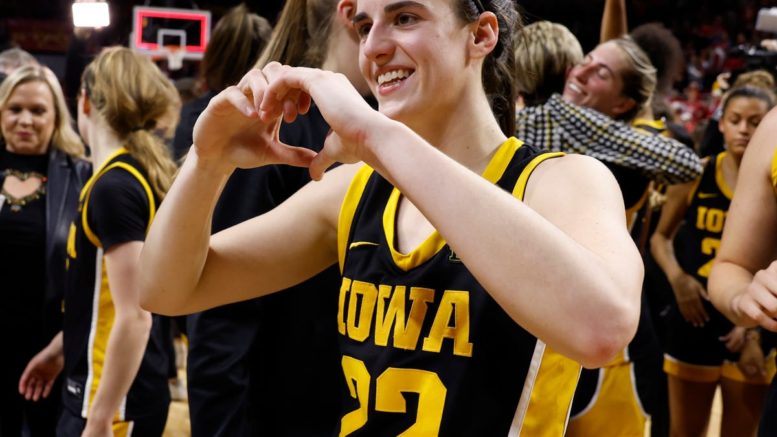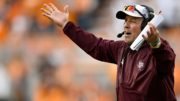Some money is better than no money until you realize how much more money you should be getting.
2023 has been good for Caitlin Clark. After a March Madness run that took her to the National Championship Game, making her America’s latest sweetheart, she’s started the 2023-2024 season on fire (29.5 points,7.4 assists, and 6.9 rebounds per game) and seems to be a lock to the Indiana Fever, who have the No. 1 pick in the 2024 WNBA Draft.
But most importantly, Clark is getting paid. According to a report from Front Office Sports, her NIL portfolio has solidified her as “one of the most marketable college athletes.” Clark is the first college athlete to sign with State Farm and has deals with Nike, Buick, Topps and H&R Block. She also joins UConn’s Paige Bueckers, Penn State’s Nick Singleton, and Colorado’s Shedeur Sanders as the only four college kids with Gatorade deals. The company is donating $22,000 to the Caitlin Clark Foundation.
“This partnership is special because not only does Gatorade fuel the best athletes in the game, but they’re also committed to leading by example and giving back, which is what I strive to do every day,” she said in a statement. “I’m honored to join such an iconic brand that has some of the most elite athletes in sport on their roster and can’t wait for what’s ahead.”
This is the part where you can be happy that a woman in sports is getting compensated just as good, or better, than the men, but still be upset that she, and other women and men, aren’t getting anything close to what they deserve.
“NIL, the much-ballyhooed acronym that allows college athletes to turn their name, image and likeness into cash and gifts, was never a remedy for college sports’ inequity. Its promotion, however, confused many into believing as much. But it’s just some court decision-inspired patchwork relief for athletes from the NCAA’s long-onerous control of their fame, which the association turned into gobs of dough through commercialization that helped make multimillionaires out of coaches, athletic directors, conference commissioners and NCAA honchos,” wrote the Washington Post’s Kevin B. Blackistone in a recent column titled, “Players still don’t get paid. That’s the real college football scandal,” as he highlighted a recent lawsuit in California about college athletes being prevented from being paid. “The movement afoot now will force colleges and universities to hand over a share of the loot they make off the blood and sweat of those athletes, disproportionately Black males in football and basketball — just like professional sports leagues bargain with their athletes. After all, it has been a couple of generations since there was a discernible difference between how the pros thrive and how major college sports work,” he wrote.
It’s as if somebody outside of journalists and media members with some power should say or do something.
“I would take less money for the players to be compensated. I would take less money for the players to have a share. I hope other coaches would use their voices to express the same thing,” said Michigan head football coach Jim Harbaugh a few weeks ago.
Harbaugh is in the minority, and that’s just one of the many issues around this thing. For instance, recently fired head coach Jimbo Fisher ($77 million) and newly hired head coach Mike Elko ($42 million) are owed $119 by Texas A&M. Being a fired college football head coach has become the best job in America as they make millions while players are fighting to get scraps. Indiana’s Tom Allen ($15.5 million), Houston’s Dana Holgorsen ($14.8 million), Mississippi State’s Zach Arnett ($4.5 million), Syracuse’s Dino Babers ($4 million, estimate; private school), Boise State’s Andy Avalos ($3 million) and New Mexico’s Danny Gonzales ($400,000) are all getting paid handsomely to not work anymore, while we’re supposed to be happy that the face of Iowa’s athletic department is getting $22,000 sent to her foundation from Gatorade.
The game is rigged.
Last week, NCAA President Charlie Baker called for a new system that would create a group requiring schools to pay at least half their athletes $30,000 per year through a trust fund. The semantics still haven’t been flushed out and no one knows what this would look like besides HBCUs, mid-majors, and the have-nots all being completely screwed. Like NIL, this new system would be another Band-Aid on a severely broken and bleeding arm. Sadly enough, it seems bound to continue. Because while Caitlin Clark and the likes are getting some money, college athletes won’t see “real money” until they’re recognized for what they really are — student employees.
Original source here
#Caitlin #Clark #cleaning #NIL #college #athletes #arent #close #deserve





